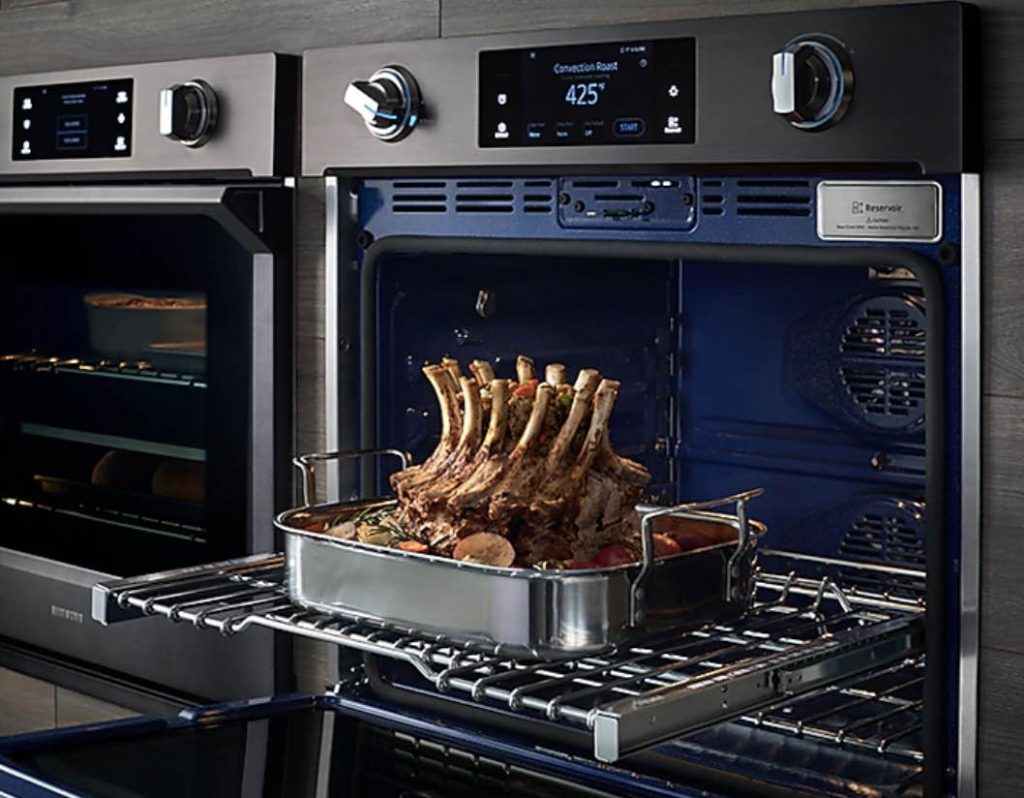What to do if your oven is not cooking evenly? Playing ‘hot and cold’ with your dinner plans?
Samsung ovens are designed to make cooking easier, faster, and more delicious. They have the tools and technology to help you create culinary masterpieces, ( Wi-Fi connectivity, smart cooking, air fry, steam clean, large capacity, safety features, smart dial, etc). And here are some reasons of why Samsung oven not cooking evenly:
- Incorrect rack position. If you position the oven rack too close or too far away from the heating element, it can cause food to become overcooked or undercooked.
- Not Pre-Heated! Cooking evenly requires waiting until the oven reaches the desired temperature before placing dishes inside.
- Opening the Oven Door. The oven loses heat when you open the door too often or for too long.
- Oven Thermostat Needs to be Calibrated. Uneven cooking can result from an incorrectly calibrated oven thermostat.
- Defective Samsung heating element. Uneven heat distribution throughout the oven may occur due to defective heating elements from Samsung.
- Faulty Samsung oven temperature sensor. If the temperature sensor in the Samsung oven is not correctly positioned, it may fail to achieve proper cooking temperatures.
- Convection oven fan malfunction. A malfunctioning fan in the convection oven can cause uneven circulation of heat.
- Bake element. Uneven cooking may result from a burned-out bake element.
Samsung oven repairs vs replacement, some facts to consider.
Age of the Oven: Take into account the age of the oven and its expected lifespan. If the oven is relatively new and still under warranty, repairing it might be the more cost-effective option. However, if the oven is older and experiencing frequent issues, replacing it might be a better long-term solution.
Extent of Damage: Assess the extent of the damage or malfunction. Minor issues such as a faulty heating element or temperature sensor can often be repaired at a reasonable cost. However, if the damage is extensive or if multiple components are failing, the cost of repairs may outweigh the value of the oven.
Cost of Repairs vs. Replacement: Compare the cost of repairs to the cost of purchasing a new oven. Consider not only the upfront repair costs but also any potential future repairs that may be needed. If the cost of repairs is significant and approaching the cost of a new oven, replacing it may be the more economical choice.
Energy Efficiency: Newer ovens are often more energy-efficient than older models. If your current oven is outdated and consuming more energy than necessary, replacing it with a newer, more energy-efficient model could lead to long-term savings on utility bills.
Technological Advancements: Take into account any technological advancements or features that newer oven models offer. Upgrading to a newer model may provide additional functionality, convenience, and cooking capabilities that are not available with your current oven.
Safety Concerns: If the oven poses safety risks due to issues such as faulty wiring or gas leaks, replacing it may be the safest option to ensure the well-being of your household.
Resale Value: If you plan to sell your home in the near future, consider the impact of a malfunctioning oven on the resale value. A fully functional, modern oven may increase the appeal of your home to potential buyers.

For the best oven repair results in Charleston, Summerville and surrounding areas, contact us by phone or Request a Quote.
Follow us on Facebook to not miss the latest news!



